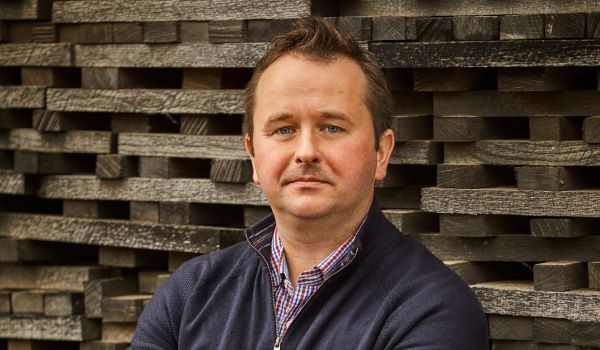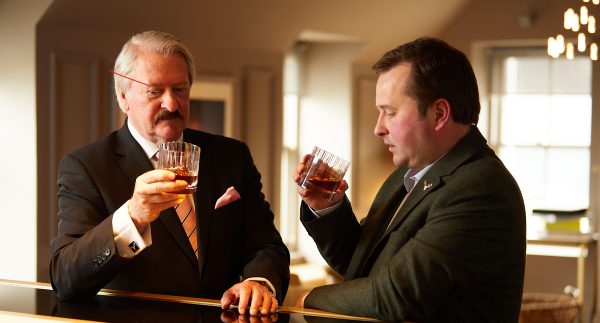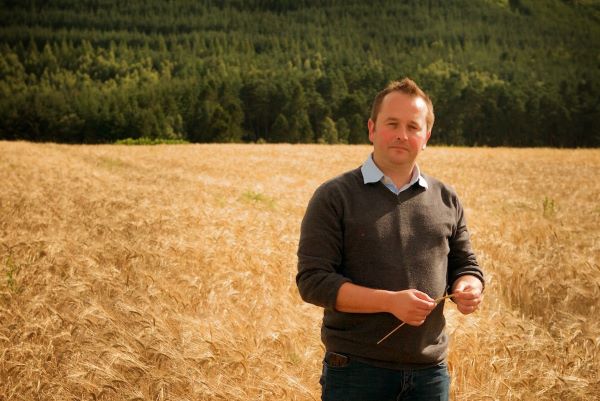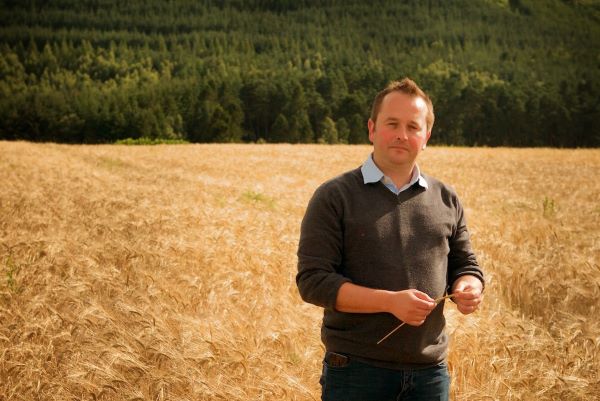A dram with Gregg Glass
The destiny of Whyte & Mackay master whisky maker Gregg Glass seems to have been foretold by a childhood on the Black Isle, across the Cromarty Firth from the company's Dalmore distillery. He talks to Richard Woodard about role models, teamwork and Scottish oak …
Gregg Glass has been involved in making Scotch whisky for nearly 20 years, but the association runs even deeper than that. Glass grew up on the Black Isle, north of Inverness – a fertile spot famed for providing barley for distillation – and, during a childhood he describes as "fantastic", whisky was literally never very far away.
"The Dalmore Distillery is right across the water from the Black Isle, so it really was our local distillery," he says. "A few of us in the company [Whyte & Mackay] grew up here, and you will find many people across the Black Isle with a connection to The Dalmore, and a story of the characters that have worked there through the years."
But having a hand in making The Dalmore single malt would have to wait. First, there were studies at Glasgow University and a holiday job as a tour guide at another nearby distillery, Diageo's Glen Ord plant.
Glass's big break came in 2005, when he landed a job with independent bottler Compass Box, founded by John Glaser, one of the great creative minds in the recent history of Scotch and the man behind such feted whiskies as Hedonism, Peat Monster and The Spice Tree.

"What John has done is incredible," says Glass. "Speaking for myself, the time at Compass Box, what we achieved as a team, was incredible. John's vision is unique. It was a stepping-stone for people that have gone on to do amazing things." And he says of the recently-announced news that Glaser is to leave the business: "It is the end of an era. It will be interesting to see what John does next."
After just over a decade at Compass Box, Glass made the move in late 2016 to Whyte & Mackay as blender and whisky maker, swapping one huge personality in Glaser for another – legendary Whyte & Mackay master blender Richard Paterson. The move garnered much attention in Scotch circles, not least because of the perception that Glass was to be trained as Paterson's successor ahead of the latter's anticipated retirement.
More than seven years on, Glass and Paterson – now 75 – still work together, although the latter has a reduced role these days. They offer strongly contrasting characters – Glass understated and softly-spoken, Paterson an incorrigible showman famed for throwing whisky around during masterclasses – but perhaps that's the secret of a good working relationship.
"Richard is fantastic, and the difference he has made, not only as a whisky maker, but to the industry and the community, is unique," says Glass. "His passion is not only the whisky he makes, but the people, and I really admire what he has achieved."

Such are the demands made on a modern master distiller/blender – the never-ending conveyor belt of new releases, the demanding travel schedule – that this is no more the fiefdom of a single dominant individual, but a collective effort.
At Whyte & Mackay, beyond Paterson, Glass namechecks ‘Mags' – Margaret Nicol – Joe Ricketts, Kirsty Hodge, Nicholas Wilson and new master whisky maker (a title she shares with Glass) Dr Kirstie McCallum. Each, he says, offers their own unique perspective on whisky making.
Then there's Stewart Walker, distillery manager at Fettercairn, an emerging Whyte & Mackay single malt celebrating its bicentenary this year. "Richard introduced Stewart and I not long after I joined the company," Glass recalls. "For myself, Fettercairn is a special place.
"What we have done together at Fettercairn is not only to continue in the spirit of a 200-year-old distillery, but in actual fact to look forward, and really consider what a distillery will need to be sustained into the future." A new Fettercairn collection will mark the 200th anniversary this summer.

Glass's career at Whyte & Mackay has also encompassed the 2018 relaunch of Jura – his first, and one that is now being taken on by Ricketts with new expressions due for release later this year – and his extensive work with Scottish oak, from acorn to cask.
A wide-ranging programme encompassing the planting of 13,000 oak saplings near Fettercairn distillery, the Scottish Oak Programme is now a "community" taking in those who grow, harvest, mill, cooper and fill Scottish oak casks, although Glass acknowledges that it "took time to rekindle" the skills and experience required.
He hopes that the result will be there for the next 200 years of Fettercairn. "Scottish oak was, for me, not for us at Fettercairn, or at Whyte & Mackay, but for the industry actually," he explains. "The aim was to create a resource for the spirits industry, inspiration for the future and the knowledge to make it work."
The programme also taps into Glass's belief that Scotch whisky can transcend its narrow identity as an alcoholic drink and connect with a diverse array of craftspeople across Scotland and beyond. His work with the likes of The Dalmore leads him into conversations with book-makers and tanners, architects and cabinet-makers.
While the liquid will always be king – Glass describes the annual November pilgrimage to delve into the rarest casks in the Dalmore warehouses as "magic" – his passion has migrated well beyond the mere transformation of Black Isle barley into Highland single malt. "If I couldn't be a whisky maker, I tend to say, I would be a cooper," he explains about his need to connect with the natural environment and craft something from it. "For me, being a whisky maker is about so much more than making whisky. It is holistic and touches so many different crafts."

Richard Woodard has been writing about spirits and wine for 20 years, editing and contributing to a number of magazines and websites, including Decanter, The Spirits Business, just-drinks.com and Club Oenologique. He was also one of the founding editors of Scotchwhisky.com.




